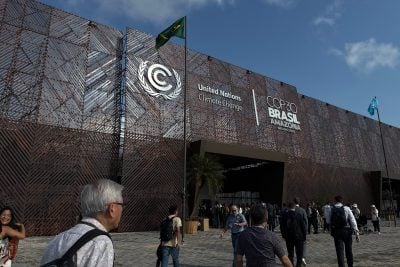South Africa’s electricity minister Kgosientsho Ramokgopa has become the latest figure to criticise his own government’s Just Energy Transition Investment Plan. The so-called JETP deal, originally agreed at the Cop26 climate summit in Glasgow in 2021, commits South Africa to accelerating its phase-out of coal-fired power generation in return for funding from a group of leading economies.
South Africa became the first country in the world to sign a JETP deal. It is in line to receive up to $8.5bn under the programme, which President Cyril Ramaphosa hopes will catalyse much greater levels of private investment into renewable energy generation.
But JETP has never been universally popular among Ramaphosa’s colleagues. Gwede Mantashe, the powerful minister of mineral resources and energy, has implicitly criticised the deal on multiple occasions, arguing that coal must retain a role in the energy mix. Unions allied to the ruling African National Congress are also determined to preserve hundreds of thousands of jobs in the coal industry.
Now, with the country enduring a nightmare year of “load-shedding” (power rationing), Ramokgopa has added his voice to the chorus of criticism. Speaking at an event organised by Standard Bank, the minister described the closure of Komati power plant, the first coal-fired power station to shut since the JETP programme was agreed, as “an injustice” perpetrated “in the name of the transition”.
He claimed that the power plant closed last October “because someone gave us money and said decarbonise”, adding that alternative sources of energy that have been brought online fail to compensate for the loss of coal-fired generation at Komati.
A just transition?
While Ramokgopa spoke of Komati’s theoretical generating capacity of 1,000 MW, in fact only one of the 60-year-old plant’s nine units had been operational at the time of its decommissioning – and this supplied just 121 MW.
Even so, many parts of South African civil society agree that critics of JETP have a point. Nkateko Chauke, programme director at Oxfam South Africa, points out that almost all of the $8.5bn funding promised under JETP is set to take the form of loans and loan guarantees (only 4% will be delivered as grants).
“An energy transition framed through the current lens of the JETP is unlikely to be ‘just’,” she says. Chauke warns that private sector investment in electricity generation through the JETP framework means that plan is “prioritising private-sector profit opportunities in infrastructure provisioning while the state assumes the risk.”
“A JETP must prioritise justice, both in how it is designed, and where the benefits flow,” agrees Richard Halsey, a policy advisor in the South African energy team at the International Institute for Sustainable Development. Yet he disputes the implication that the JETP is being unjustly foisted upon South Africa.
“The point of the JETP is not to meet some foreign agenda,” says Halsey. “From a climate change, environmental, human health, economic, and equity perspective, South Africa has no choice but to follow a just transition to lower carbon energy system.”
Meanwhile, other African countries are considering their own JETP programmes. In June, Senegal became the second African country to agree a deal. Halsey describes this as “encouraging news”, adding that a JETP framework can provide “a real opportunity” for other African countries “to jumpstart their clean energy transitions”.
He concedes, however, that “There are lots of lessons to be learned from the JETP process in South Africa”. He specifies the need for greater participation and transparency in the design of a JETP as key learnings that could help other African countries ensure that transition plans enjoy public and political support.
Want to continue reading? Subscribe today.
You've read all your free articles for this month! Subscribe now to enjoy full access to our content.
Digital Monthly
£8.00 / month
Receive full unlimited access to our articles, opinions, podcasts and more.
Digital Yearly
£70.00 / year
Our best value offer - save £26 and gain access to all of our digital content for an entire year!

 Sign in with Google
Sign in with Google 



